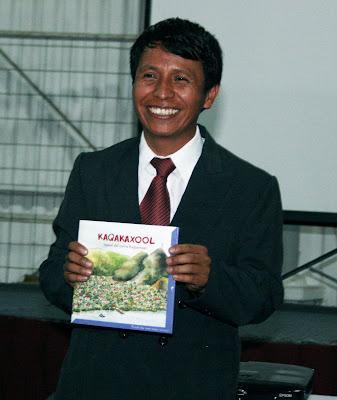On July 22nd at Guatemala’s Annual International Book Fair (FILGUA), Riecken presented its new collection of eight bilingual books developed by six communities through their libraries. In attendance were editors, publishers, members of the academic and NGO sectors, and the general public. The participating communities were: Chiché, El Quiché; Xolsacmaljá, Totonicapán; San Juan la Laguna, Sololá; and San Carlos Sija, Huitán and Cabricán in Quetzaltenango. The event was the culmination of a creative and educational process coordinated by Riecken Community Libraries with the publishers Amanuense Group, engaging local library directors, writers and artists, and volunteers to compile and publish oral histories and folktales narrated by Mayan elders in their communities. The project aims to conserve traditional culture, inspire creativity, and value diversity. Bilingual literature in Spanish and Mayan languages is rare in Guatemala and the region. The books, developed through a grassroots process, empower local people to express their traditions and values in both word and art through high quality materials, and help position Riecken Community Libraries as an active promoter of indigenous people’s rights to access relevant literature and information in their native languages.
 |
| Israel Quic, Cultural Identity Director, with his community’s book (San Juan La Laguna) |
The presentation was an inspirational moment filled with satisfaction and pride, reflected in those participants who officially received the books representing their communities. One of the participants held his cell phone to one of the loudspeakers during most of the event, transmitting the news to Cabricán, where it was simultaneously broadcast over the community radio station in the region. One thousand copies were printed of each title, which are available at Antigua and Guatemala City bookstores, and directly from Riecken. The project was made possible with the support of the Cooperation for Development Fund of the Embassy of Finland in Nicaragua, and Inherit-MACHI.

